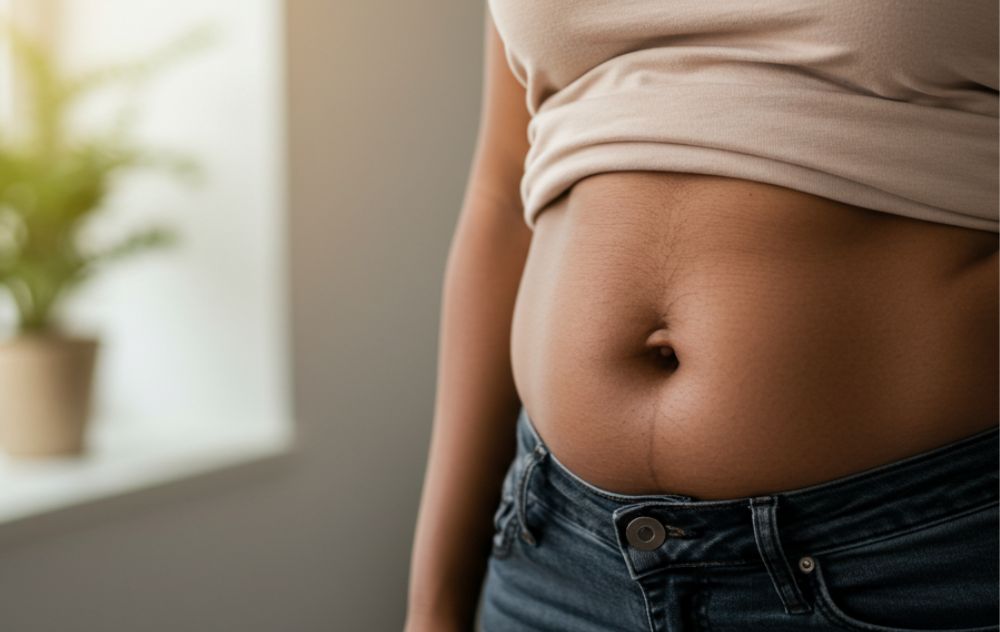
If you’ve noticed a stubborn stomach bulge, it might not be just bloating or weight gain, it can be a visible and uncomfortable symptom of uterine fibroids. A fibroid belly bulge is a common yet often overlooked symptom of uterine fibroids. As these noncancerous tumors expand, they can create a stomach bulge that doesn’t go away with diet or exercise. A fibroid belly is often firm, persistent, and accompanied by other symptoms like heavy periods or pelvic pressure.
What is a Fibroid Belly?
A fibroid belly or fibroid belly bulge, is a term used to describe a visibly enlarged or protruding lower abdomen caused by uterine fibroids. When fibroids enlarge, the uterus expands to accommodate their size. This can stretch and exert force on the abdominal wall, which may lead to discomfort, protrusion, and even posture issues. This pressure can also interfere with digestion and bowel movements, contributing to ongoing bloating and discomfort. This type of abdominal swelling is often mistaken for weight gain or early pregnancy, causing both physical and emotional distress for many women.¹ Unlike regular bloating caused by digestion, a fibroid belly bulge often feels firm to the touch and doesn’t fluctuate throughout the day.
What Does a Fibroid Belly Look Like?
A fibroid belly appears rounded and firm, especially in the area just above the pubic bone. Fibroid belly bulge differs from bloating caused by gas or digestion, which can come and go, as it remains constant and doesn’t flatten with movement or rest. And unlike soft belly fat, this type of bulge usually has a taut or bloated appearance and doesn’t shift or compress easily. The size and shape of the stomach can vary depending on the size and number of fibroids, but the overall look is one of fullness or distension concentrated in the lower abdomen.
Signs You Might Have a Fibroid Tumor in Your Stomach
Here are some key signs that you may have a fibroid belly bulge:
- Abdominal distention unrelated to medication or medical conditions
- Pelvic pressure or fullness
- Prolonged or heavy menstrual periods
- Frequent urination
- Constipation due to pressure on the small intestine
If you’re noticing these signs together, especially a consistent lower belly bulge, it may be time to speak with a fibroid specialist to confirm if fibroid tumor growth is the cause. There is always a possibility that fibroids will continue to grow larger as long as they have a consistent blood supply. Other possible causes for bloating or an enlarged uterus include adenomyosis and ovarian cysts. A consultation can help determine whether fibroids may be the cause.
MEET WITH A FIBROID SPECIALIST
When to Be Concerned About a Fibroid Stomach Bulge
While a fibroid stomach bulge may start as a mild or occasional swelling, it can be a sign of more serious fibroid-related complications, especially when it affects your daily life or is accompanied by other symptoms. You should be concerned about uterine fibroid belly if:
- Rapidly growing or firm belly bulge: A bulge that increases in size quickly or feels firmer than usual may indicate accelerated fibroid growth or uterine enlargement. If untreated, this can lead to increased pressure on nearby organs and more severe complications over time.
- Bloating that doesn’t improve with lifestyle changes: Bloating that is persistent and unresponsive to adjustments to eating habits, physical activity, or fluid intake may need fibroid treatment to resolve.
- Severe or unpredictable bleeding along with abdominal swelling: Heavy, prolonged, or irregular bleeding with a fibroid belly can increase your risk for anemia or other reproductive issues.
- New or intensifying pelvic pain or pressure: Experiencing increased and more frequent pressure, pain, or urinary and bowel issues.
These symptoms may indicate that the fibroids are growing, pressing on nearby organs, or contributing to other health issues.
How to Get Rid of Fibroid Belly?
Getting rid of a fibroid belly usually requires treating the fibroids themselves. This is the most effective way to reduce or eliminate the abdominal swelling and discomfort associated with a fibroid belly bulge. There are effective treatments available that can shrink or remove fibroids and reduce abdominal distension. One of the most popular options is Uterine Fibroid Embolization (UFE),
UFE is a highly advanced, minimally invasive treatment designed to shrink fibroids without removing the uterus. UFE is a non-surgical outpatient procedure that works by cutting off the fibroid’s blood supply, causing it to shrink over time. As they shrink, the uterus returns to a more normal size, and the fibroid belly bulge gradually diminishes.
Watch Cara Maria Sorbello discuss how UFE helped her eliminate her fibroid belly:
The benefits of UFE include:
- Reduces fibroid size and shrinks the uterus, which can lead to a flatter abdomen and relief from the pressure or bloating caused by large fibroids
- No incisions or stitches as UFE is performed through a tiny catheter inserted in the wrist or groin, avoiding scarring that could worsen bloating or abdominal discomfort.
- With most patients returning to normal activities within one to two weeks, UFE offers a quicker path to reducing fibroid-related abdominal heaviness and visible bulging.
- Treats multiple or hard-to-reach fibroids at once, helping reduce the overall size of an enlarged uterus.
- Preserves the uterus while improving abdominal appearance, offering an alternative to a hysterectomy and allowing women to maintain fertility options.
Treatment for Fibroid Belly Bulge
If you’ve noticed a persistent uterine fibroid belly and suspect fibroids may be the cause, don’t wait to get answers. Consult with a fibroid specialist at USA Fibroid Centers to determine if UFE can help the fibroids and the discomfort that are affecting your body and confidence. With clinic locations nationwide, consultations are available near you, allowing you to receive the care you need when you need it.
To learn more about UFE and how it can help reduce your fibroid belly bulge, schedule an appointment online or call us at 855.615.2555.
FAQs About Fibroids and Belly Swelling
Is a Fibroid Belly Dangerous?
A fibroid belly is not dangerous by itself, but it can signal more serious issues and lead to complications if left untreated. Enlarged fibroids may press on nearby organs, causing urinary issues, constipation, and back pain. In rare cases, they can cause a sudden, sharp abdominal pain or severe bleeding, requiring urgent medical treatment.
Can Diet or Exercise Shrink a Fibroid Belly?
Diet and exercise alone cannot shrink fibroids or eliminate a fibroid belly bulge, but can help manage mild symptoms. To shrink or reduce the fibroid belly bulge long-term, medical treatment like uterine fibroid embolization (UFE) is usually necessary.
Can a Fibroid Belly Change Throughout the Month?
A fibroid belly can fluctuate in size throughout the month due to hormones that fluctuate during a woman’s menstrual cycle and can cause fibroids to grow or shrink, causing noticeable changes in the size of the abdomen.
Can Fibroids Cause Lower Belly Bulge Without Other Symptoms?
Uterine fibroids can cause a lower belly bulge even without other noticeable symptoms. Because a lower abdominal bulge can stem from various causes, consult a doctor if you notice any unusual changes, even if you’re not experiencing other symptoms.
Can Fibroid Tumors Make Your Stomach Big?
Fibroids can make your stomach appear big, especially when they grow significantly or are in clusters. Sometimes, the uterus expands so much it resembles a second-trimester pregnancy. While smaller fibroids may not visibly alter the abdomen, they can still cause symptoms like pelvic discomfort, frequent urination, constipation, or heavy menstrual bleeding.
Sources
- Stephanie E Chiuve et al., “Uterine Fibroids and Incidence of Depression, Anxiety and Self-Directed Violence: A Cohort Study,” Journal of Epidemiology and Community Health.





